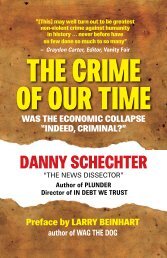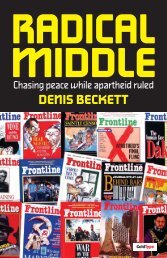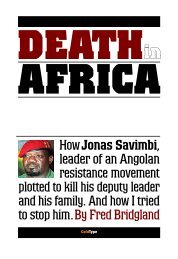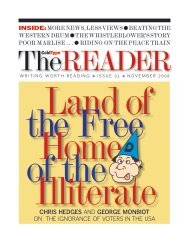UPDATED - ColdType
UPDATED - ColdType
UPDATED - ColdType
- TAGS
- updated
- coldtype
- coldtype.net
You also want an ePaper? Increase the reach of your titles
YUMPU automatically turns print PDFs into web optimized ePapers that Google loves.
What is the connection between the war, the pro-<br />
Bush coverage we have been seeing and the<br />
upcoming June 2 FCC decision that is expected<br />
to relax broadcast regulations? Is it unthinkable<br />
to suggest that big media companies stand to<br />
make windfall profits once Colin Powell’s son,<br />
FCC chief Michael Powell, engineers new rules<br />
that permit more media mergers and concentration?<br />
Would these big media companies want to<br />
appease and please an administration that frequently<br />
bullies its opponents?<br />
According to experts cited by the Los Angeles<br />
Times, if the media moguls get what they want,<br />
only a dozen or so companies will own most U.S.<br />
stations, giving them even more control over the<br />
marketplace of ideas than they already have.<br />
Jeff Chester of the Center for Digital Democracy<br />
explains, “The ownership rules on the FCC<br />
chopping block have been developed over the<br />
last 50 years. They have been an important safeguard<br />
ensuring the public’s basic First Amendment<br />
rights. The rationale for these policies is<br />
that they help provide for a diverse media marketplace<br />
of ideas, essential for a democracy.<br />
They have not been perfect. But the rules have<br />
helped constrain the power of the corporate<br />
media giants.”<br />
The FCC is, in effect, holding out the possibility<br />
of freeing the networks from restrictions on<br />
owning more stations. At a time when the industry<br />
is hurting financially, big bucks are once<br />
again being dangled in front of media moguls. No<br />
wonder none will challenge the government on<br />
the current war effort. Would you be surprised<br />
that the Conservative News Service gave its<br />
award for best Iraq war coverage of the war to<br />
Dan Rather (and not Fox because of Geraldo’s<br />
antics)? This is the same CBS that was once<br />
WINNERS AND LOSERS<br />
41<br />
admired for the reporting of Edward R. Murrow<br />
and Walter Cronkite.<br />
Powell makes the connection between the war<br />
and his agenda. He says that bigger media companies<br />
are needed more than ever because only<br />
they can cover the war the way the Iraq war was<br />
covered. Need he say any more?<br />
At first glance, the relationship between media<br />
concentration and what we see on TV seems tenuous.<br />
But is it? The cutbacks in coverage of<br />
world news that left so many Americans uninformed<br />
and unprepared for what happened on<br />
9/11 took place in the greatest wave of media consolidation<br />
in history. It has already had an effect.<br />
– AlterNet, May 7, 2003 ●<br />
WHITE HOUSE PRESS PARTY<br />
BECOMES A BUSH RALLY<br />
NEW YORK, APRIL 29, 2003 – It was an uncomfortable<br />
scene: a roomful of some of the most<br />
powerful journalists in America applauding the<br />
President as he boasted of his success in Iraq. It<br />
didn’t happen in the White House but it might<br />
have, since the positive reception was offered up<br />
by White House correspondents at their association’s<br />
annual dinner in Washington.<br />
It was April 26, the 70th anniversary of the<br />
bombing of Guernica in Spain. But the symbolism<br />
was no more appreciated there than it had<br />
been at the United Nations some months earlier.<br />
At that time a tapestry copy of Picasso’s famous<br />
painting of that wartime atrocity displayed outside<br />
the Security Council chambers was draped<br />
at Washington’s request when Secretary of State<br />
Powell came to make the case for a war on Iraq.

















